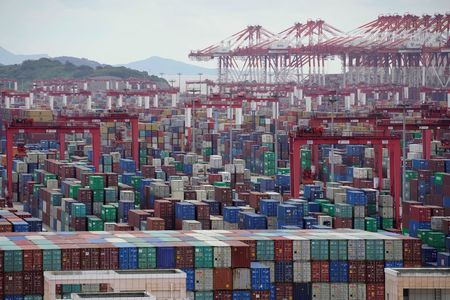BEIJING (Reuters) – China’s economy is facing growing risks of slowing external demand in the fourth quarter, a commerce ministry spokesperson said on Thursday, adding that uncertainties were overshadowing growth in China’s foreign trade.
As the world economy loses momentum, the environment for trade was getting increasingly complex for China, commerce ministry spokesperson Shu Jueting told a regular news conference.
“Looking into the fourth quarter, the risk of slowing external demand is expected to increase,” she said.
China’s exports grew 5.7% from a year earlier in September, the slowest pace since April. Imports rose a feeble 0.3%, undershooting estimates for 1.0% growth.
It comes as monetary tightening across the world to contain red-hot inflation is curbing global economic growth.
Despite the challenges, conditions were still favourable for a stable growth in trade between China and other countries, Shu added.
Beijing’s stringent zero-COVID strategy has also squeezed sectors that are particularly sensitive to pandemic restrictions such as services.
“The consumption market continues a recovery and growth trend, but due to unexpected factors including the COVID outbreaks, market entities in sectors of brick and mortar retail, catering and accommodation still face huge pressure,” Shu said.
She expected consumption to rebound as policy support takes effect.
China’s retail sales, an indicator of consumption, grew 2.5% last month, missing forecasts for a 3.3% increase and easing from August’s 5.4% pace, underlining still fragile domestic demand.
Even if the economy rebounds at a faster-than-anticipated clip in the third quarter, a long-term recovery will be challenged by persistent COVID-19 curbs, a prolonged property slump and global recession risks, economists say.
A Reuters poll forecast China’s growth to slow to 3.2% in 2022, far below the official target of around 5.5%, marking one of the worst performances in almost half a century.
(Reporting by Ellen Zhang, Liangping Gao and Ryan Woo; editing by John Stonestreet and Ana Nicolaci da Costa)

